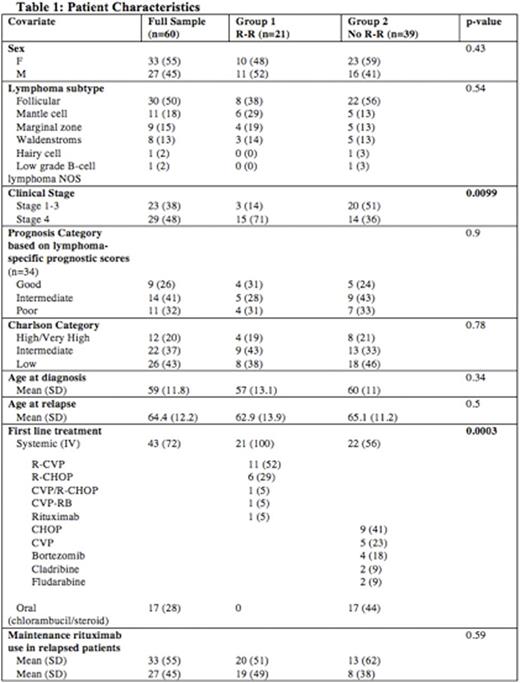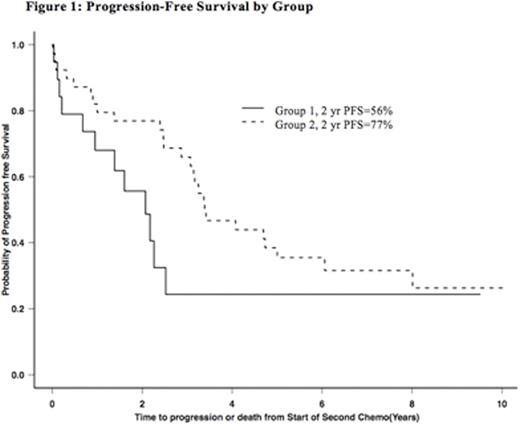Abstract
Introduction:
Evidence from several randomized clinical trials demonstrates the survival benefit and superior magnitude of disease control of rituximab use in indolent lymphomas compared to chemotherapy alone in remission induction. However, there is a paucity of evidence regarding retreatment with rituximab in patients who have previously been exposed. Despite this, Canadian agencies fund the use of rituximab retreatment in patients who have previously received rituximab, sustained a response, and been treatment free for over a year. The purpose of this study was to describe the characteristics and outcomes of patients with relapsed indolent lymphomas re-treated with a rituximab-containing regimen at Princess Margaret Cancer Centre (PM).
Methods:
This was a retrospective chart review of patients treated at a Canadian tertiary care centre (PM) with relapsed low-grade lymphomas (follicular, mantle cell, marginal zone, and lymphoplasmacyticlymphomas) between January 2006 and November 2015. The start date of January 2006 is when provincial rituximab funding became available. Patients were identified from our lymphoma and pharmacy databases. Patients were included if they had sustained a treatment free period ³1 year between first- and second-line therapy, and received rituximab as part of their second-line therapy. They were divided into two groups: Group 1 included patients who received any rituximab exposure as part of their first line therapy; Group 2 included patients na•ve to rituximab, who were treated with a non-rituximab containing first-line regimen. Primary outcome was progression-free survival (PFS) from start of second-line treatment. Secondary outcomes were overall survival (OS), overall response rate (ORR), and number of patients achieving a complete response (CR) at the end of second-line treatment.
Results:
687 patients were identified who received rituximab for indolent lymphoma treatment (any line) during this time period. Of the eligible relapsed subset, 41 transformed to aggressive lymphoma, and 39 progressed < 1yr post-first line therapy. 60 patients (55% female) met inclusion criteria, of which 21 (35%) had been retreated with rituximab during this time period. See Table 1 for patient characteristics. From start of second-line treatment, median follow-up was 43 months (range 4 to 132 months). Multivariate cox regression revealed a significant PFS difference between groups, with Group 1 having inferior PFS (2 year PFS 56% vs 77%, OR 2.38 95% CI 1.08-5.26, p=0.03, see Figure 1). Furthermore, patients who were older, had a higherCharlsoncomorbidity score, and those who did not receive maintenance rituximab had a lower PFS. More patients in Group 2 received oral chemotherapy as their first line treatment (such aschlorambuciland prednisone, reflecting an earlier treatment era, p=0.0003). There was no OS difference between groups (2 year OS 87% vs 79%, OR 1.73, 95%CI 0.64-4.64, p=0.28), although male gender and age were associated with lower OS. There was also no difference in groups in terms of ORR (75% vs 72%, p=0.8), or number achieving a CR at the end of second-line treatment (OR 0.38, 95% CI 0.11-1.37, p=0.14).
Conclusions:
Retreatment with rituximab was associated with an inferior PFS in patients with indolent lymphoma who sustained a one-year or greater response to first-line therapy with a rituximab-containing regimen, compared to rituximab-na•ve patients. This study is limited by small sample size, but our findings are consistent with other studies that evaluated rituximab retreatment in similar patient populations, and in diffuse large B-cell lymphoma. The PFS in patients retreated with rituximab was still superior to prior studies evaluating the use of second-line treatment with non-rituximab containing regimens in patients previously exposed to rituximab. There was no difference between groups in OS, ORR, or number achieving a CR at the end of treatment.
Crump:Celgene: Consultancy; Janssen-Ortho: Consultancy; Seattle Genetics: Consultancy; Roche: Consultancy. Kukreti:Lundbeck: Honoraria; Celgene: Honoraria; Amgen: Honoraria. Kuruvilla:Abbvie: Consultancy, Honoraria; Janssen: Consultancy, Honoraria; Gilead: Consultancy, Honoraria; Merck: Honoraria; BMS: Consultancy, Honoraria; Celgene: Consultancy, Honoraria; Amgen: Honoraria; Roche Canada: Consultancy, Honoraria, Research Funding; Seattle Genetics: Consultancy, Honoraria; Lundbeck: Honoraria. Tiedemann:Celgene: Honoraria; Janssen: Honoraria. Chen:Takeda: Research Funding; Celgene: Honoraria, Research Funding; Janssen: Honoraria, Research Funding. Prica:Celgene: Honoraria; Janssen: Honoraria.
Author notes
Asterisk with author names denotes non-ASH members.



This feature is available to Subscribers Only
Sign In or Create an Account Close Modal